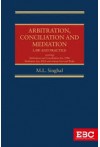- Author(s): Justice M.L. Singhal
- Publisher: Eastern Book Company
- Edition: 1 Ed 2025
- ISBN 13 9788119868492
- Approx. Pages 992 + Contents
- Format Hardbound
- Approx. Product Size 24 x 18 cms
- Delivery Time 3-5 working days (within Kerala & South India) (Others 7-9 days)
- Shipping Charge Extra (see Shopping Cart)
.....................................................................................................................................
Description
Prior to the enactment of the Arbitration and Conciliation Act, 1996, the law of arbitration was contained in three enactments, viz. the Arbitration Act, 1940, the Arbitration (Protocol and Convention) Act, 1937 and the Foreign Awards (Recognition and Enforcement) Act, 1961. The Arbitration Act, 1940 remained in force for more than five decades; during the course of time, it was felt that the Arbitration Act, 1940 had become outdated, and a new Act was necessary to make it more responsive to contemporary requirements. It was also recognised that our economic reforms may not become fully effective if the law dealing with the settlement of both domestic and international commercial disputes remains out of tune with such reforms. Like arbitration, conciliation was also getting increasing worldwide recognition as an instrument for settlement of disputes. There was, however, no general law on the subject in India.
The United Nations Commission on International Trade Law (UNCITRAL) adopted in 1985 the Model Law on International Commercial Arbitration. The General Assembly of the United Nations had recommended that all countries give due consideration to the said Model Law in view of the desirability of uniformity of the law of arbitral procedures and the specific needs of international commercial arbitration practice. The UNCITRAL also adopted in 1980 a set of Conciliation Rules. The General Assembly of the United Nations had recommended the use of these Rules in cases where disputes arise in the context of international commercial relations and the parties seek amicable settlement of their disputes by recourse to conciliation. An important feature of the UNCITRAL Model Law and Rules is that they have harmonised concepts on arbitration and conciliation of different legal systems of the world and thus contain provisions which are designed for universal application.
......................................................................................................................................
Table of Contents
PART I ARBITRATION
1. General Provisions
2. Arbitration Agreement
3. Composition of Arbitral Tribunal
4. Jurisdiction of Arbitral Tribunals
5. Conduct of Arbitral Proceedings
6. Making of Arbitral Award and Termination of Proceedings
7. Recourse Against Arbitral Award
8. Finality and Enforcement of Arbitral Awards
9. Appeals
10. Miscellaneous
PART I-A ARBITRATION COUNCIL OF INDIA
1. Arbitration Council of India
PART II ENFORCEMENT OF CERTAIN FOREIGN AWARDS
1. New York Convention Awards
2. Geneva Convention Awards
PART III CONCILIATION
1. Conciliation
PART IV SUPPLEMENTARY PROVISIONS
1. Supplementary Provisions
MEDIATION ACT, 2023
Mediation Act, 2023
APPENDICES
1. Mediation (Removal of Difficulties) Order, 2023
2. Arbitration and Conciliation (Amendment) Act, 2015
3. Arbitration and Conciliation (Amendment) Act, 2019
4. Arbitration and Conciliation (Amendment) Act, 2021
5. India International Arbitration Centre Act, 2019 ...
6. Civil Procedure Code, 1908 (Extract)
7. Mediation/Alternative Disputes Resolution Rules of High Courts
......................................................................................................................................
Author Details
Justice M.L. Singhal had a long judicial career. He joined the U.P. Judicial Services in 1964, later promoted to U.P. Higher Judicial Service and elevated to the Bench of the High Court of Allahabad. Prior to his elevation to the Bench, he worked as District Judge at Pithoragarh, Sultanpur, Azamgarh, and Lucknow. He also worked as a Law Advisor at the U.P. Public Service Commission, Allahabad, as Special Secretary (Law) in the Law Department of the U.P. Government, and as Director of Judicial Training & Research Institute, U.P. at Lucknow. He also worked as Judge at Gauhati High Court, Agartala Branch.
As an author, he has been writing, revising and editing law books for the last 50 years. He has updated two editions of Shri Bholeshwar Nath and Suranjan Chakraverti's CPC-a unique compilation/reference on the Civil Procedure Code, 1908; Sohoni's Commentary on Criminal Procedure Code, 1973; Sir John Woodroffe and Amir Ali's Law of Evidence and Sarkar's Commentary on the Code of Civil Procedure, 1908. By his writing, he has touched almost every topic in civil law and criminal law.

